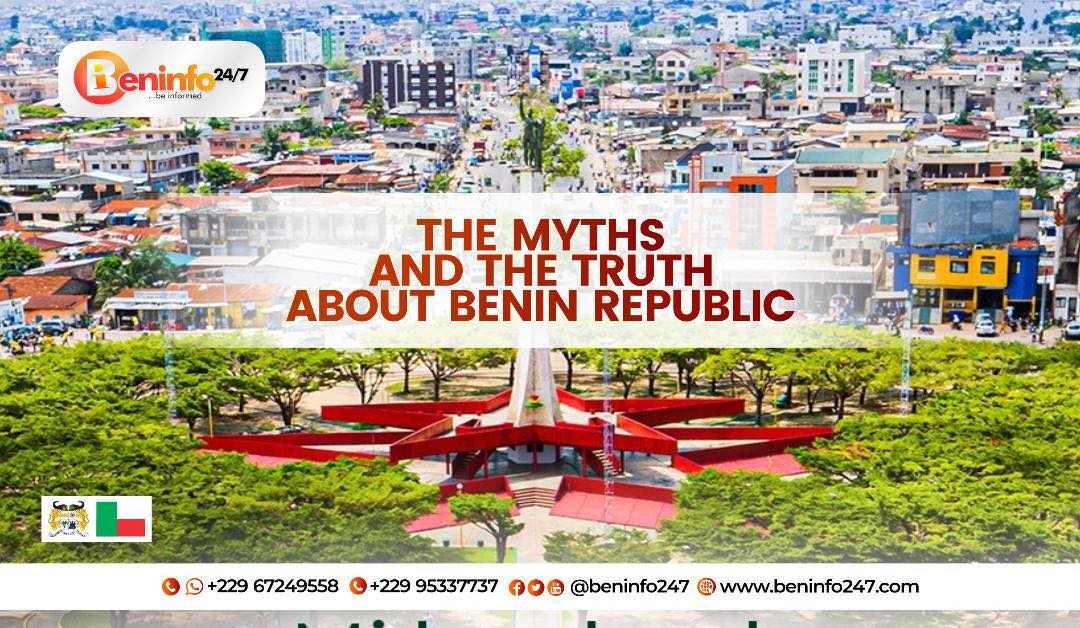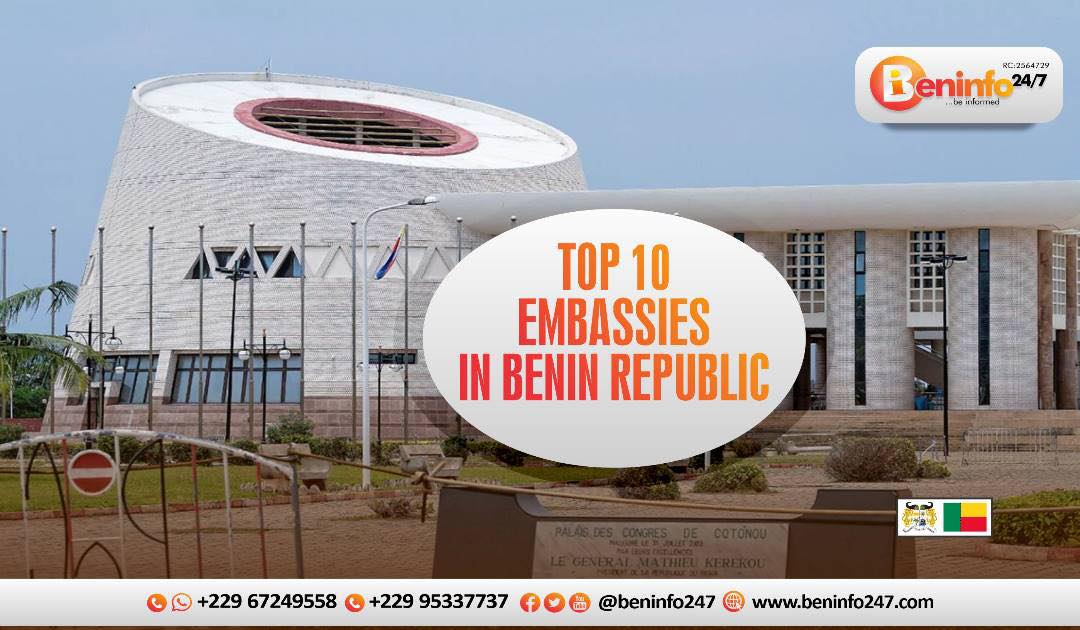The Myths and the Truth About Benin Republic
Introduction:
The Benin Republic, also referred to as the Republic of Benin, is a tiny nation in West Africa. Despite its small size, Benin is a dynamic, developing country with a rich cultural history and a bright future. Benin is often ignored as a possible location for travel, commerce, and investment due to several myths and misconceptions that surround it.
We attempt to dispel these myths and offer the facts about Benin in this essay. We will look at the nation’s history, culture, economy, and most recent changes, highlighting its many advantages. This article’s conclusion will provide readers with a better idea of what Benin has to offer and why it should be taken into consideration as a vacation, business, and tourist destination.
There are several misconceptions and false statements about the Benin Republic that are commonly believed. Here are 14 examples of these false words and the truth behind them:
Myth 1: Benin is an underdeveloped and impoverished nation.
Benin, one of West Africa’s smallest nations, is a land of abundant natural resources, history, and culture. Sadly, it is frequently misinterpreted and misrepresented as a developing, underdeveloped nation.
But in actuality, Benin is a fast-industrializing country with an expanding economy and a strong corporate sector. The government has recently put into effect several programs and policies designed to encourage economic growth and boost foreign investment in the nation. Because of this, Benin has made great advancements in fields including infrastructure, healthcare, and education.
While unemployment and poverty continue to be major problems, Benin is taking aggressive measures to solve these problems and raise the country’s residents’ level of living. The population is renowned for their friendliness, hospitality, and resiliency, and the nation has a strong, lively culture that embraces variety.
It’s time to dispel the idea that Benin is a backward and underdeveloped nation and acknowledge the development and potential of this thriving country.
Myth 2: Benin is a dangerous and unreliable nation.
Benin has maintained a stable and tranquil atmosphere despite being situated in a region that has experienced its share of instability and violence. It is regarded as one of West Africa’s most secure and politically stable countries.
Since converting to democracy in 1991, Benin has consistently upheld democratic values and has conducted several free and fair elections. A relatively low crime rate when compared to other nations in the region is the result of the government’s significant efforts to increase security and fight crime.
While it is always advisable to use caution and implement the necessary safety precautions when visiting any foreign country, Benin is generally a safe and welcoming destination for visitors. Benin is generally a safe and welcoming destination for visitors.
Myth 3: Benin is not a welcoming place for tourists.
Due to what many people see as a lack of tourist infrastructure and attractions, many people think Benin is not a desirable travel destination. But this couldn’t be further from the truth. Benin has a thriving tourism business that draws tourists from all over the world and a rich cultural heritage.
The Slave Road, the Pendjari National Park, and the Royal Palaces of Abomey are just a few of the UNESCO World Heritage Sites that can be found in Benin. Also, the nation is home to stunning beaches, natural parks, and wildlife reserves that present thrilling chances for adventure and leisure.
Beninese people are also renowned for their gracious hospitality and open-door policies toward guests. There are numerous international resorts and hotels in the nation. as well as other smaller lodging establishments that provide excellent and economical lodging.
Consequently, Benin is the ideal location to visit if you’re seeking an off-the-beaten-path holiday destination with a distinctive blend of culture, history, and natural beauty. Don’t let the misconception that Benin is an unwelcoming tourist destination keep you from exploring all that this dynamic and developing country has to offer.
Myth 4: Benin is a francophone nation and does not speak English
Due to its long-standing ties to France, Benin is frequently referred to as a Francophone nation. This does not imply, however, that the nation is unwelcoming to English speakers. In truth, English is a language that is extensively spoken throughout the nation, particularly in the south. Although French is the country of Benin’s official language, numerous other regional tongues, including Fon, Yoruba, and Mina, are also widely used. In hotels, eateries, and other tourist-oriented locations, English is frequently spoken, and many people who work in the tourism sector are fluent English speakers. Hence, visitors to Benin shouldn’t be discouraged by language barriers.
Myth 5: Benin Republic is a dumping area for toxic waste and electronic waste from developed countries.
Benin Republic, like many other developing countries, has struggled with issues related to waste management, including illegal dumping and poor regulation of imported electronic waste. However, the government has taken steps to address these issues, including enacting laws to regulate the importation and disposal of electronic waste and working with international organizations to improve waste management practices.
Myth 6: Benin Republic is a war-torn country.
The Benin Republic is a relatively peaceful country. It has not been involved in any major wars or conflicts in recent history.
Myth 7: Benin Republic is a dangerous country.
While there is some level of crime in Benin Republic, it is generally safe for tourists and visitors. The government has taken measures to improve security and ensure the safety of its citizens and visitors.
Myth 8: There are no modern amenities in Benin Republic.
The Benin Republic has modern amenities such as good transportation networks, access to electricity, modern hospitals and medical facilities, and internet access.
Myth 9: The people of Benin Republic are uncivilized and uneducated.
The people of Benin Republic are diverse and educated. They have a rich cultural heritage and a long history of producing great scholars, artists, and musicians.
Myth 10: Benin Republic is a landlocked country.
Benin Republic has access to the Atlantic Ocean and has a thriving port in the city of Cotonou.
Myth 11: The economy of Benin Republic is solely dependent on agriculture.
While agriculture is an important part of the economy, Benin Republic has a diverse economy that includes industries such as manufacturing, tourism, and services.
Myth 12 The government of the Benin Republic is corrupt.
While corruption is a challenge in Benin Republic, the government has made significant efforts to fight it. There have been several high-profile cases of corruption in recent years, and the government has taken steps to strengthen transparency and accountability.
Myth 13: Benin Republic has no democracy.
Benin Republic is a democratic country with a multi-party system. It has held several successful presidential and parliamentary elections since the adoption of a new constitution in 1990 and is considered one of the most stable democracies in Africa.
Myth 14: Benin Republic has no infrastructure or modern amenities.
While Benin Republic may not have the same level of infrastructure as developed countries, it has made significant strides in recent years. The country has modern airports, seaports, and major roads connecting its cities. There are also several modern hotels, restaurants, and shopping malls in the capital city, Cotonou.
Myth 15: Benin Republic is a homogeneous country with no cultural diversity.
Benin Republic is a diverse country with over 40 ethnic groups, each with its unique cultural traditions, languages, and customs. The country’s arts, music, and cuisine reflect this diversity, making it a rich and vibrant cultural destination.
Myth 16: Benin Republic is a backward country with no technological advancements.
While Benin Republic may not be a technological powerhouse, the country has made significant strides in recent years. The government has invested heavily in telecommunications infrastructure, leading to widespread access to mobile phones and the internet. The country also has a thriving tech industry, with several startups emerging in recent years.
Myth 17: Benin Republic is a country of primitive people who live in huts.
While it is true that many rural areas of Benin Republic still practice traditional ways of life, the country has modern urban areas with a high standard of living. The capital city of Cotonou is a bustling metropolis with modern amenities, and many of its citizens enjoy a comfortable middle-class lifestyle.
Myth 18:: Benin Republic is a country of disease and poverty.
While Benin Republic still faces challenges related to poverty and disease, the country has made significant progress in recent years. The government has invested in healthcare infrastructure, leading to improvements in life expectancy and reductions in infant mortality rates. The country has also made significant strides in reducing poverty, with the poverty rate dropping from 36.2% in 2015 to 28.9% in 2019
Conclusion
Benin Republic is a vibrant and growing nation with a lot to offer. Despite the myths surrounding the country, Benin is a peaceful, safe, and friendly destination for travelers and investors alike. Its rich cultural heritage, stunning natural beauty, and thriving economy make it an attractive place to visit or do business. By debunking these myths, we hope to encourage more people to discover the truth about Benin and all that it has to offer.
The Benin Republic, like many other African countries, has had a reputation for being poor and underdeveloped for many years. However, in recent years, the country has made significant strides in economic growth and poverty reduction, challenging the stereotype of a perpetually impoverished nation.
Before the turn of the millennium, the Benin Republic was considered one of the poorest countries in the world, with high rates of poverty and unemployment. Its economy was heavily dependent on subsistence agriculture and the export of a limited range of commodities, such as cotton and cashews. Additionally, political instability and corruption hindered the country’s progress and made it difficult to attract foreign investment.
However, since the early 2000s, the Benin Republic has experienced sustained economic growth, averaging around 5% per year. This has been driven by increased investment in infrastructure, agriculture, and industry, as well as efforts to reduce corruption and improve governance. The country has also benefited from debt relief and increased aid from international donors.
Today, the Benin Republic is a lower-middle-income country with a growing economy and a diverse range of industries, including manufacturing, mining, and services. Poverty rates have declined significantly, with the percentage of the population living below the poverty line dropping from 36.2% in 2002 to 25.6% in 2017. The country has also made progress in areas such as education and health, with increased access to basic services and a decline in infant mortality rates.
Despite these positive developments, there are still challenges that need to be addressed in the Benin Republic. For example, inequality remains high, with significant disparities between urban and rural areas and between different regions of the country. Environmental degradation and climate change are also major concerns, with deforestation and desertification affecting many parts of the country. Additionally, corruption and political instability continue to pose challenges to governance and economic development.
It is important to note that some of the stereotypes about the Benin Republic, such as its alleged lack of infrastructure or technological development, are false or outdated. The country has made significant investments in areas such as transportation and telecommunications and is home to a growing startup scene and a vibrant arts and culture scene.
RELATED POSTS






 Protected by Patchstack
Protected by Patchstack